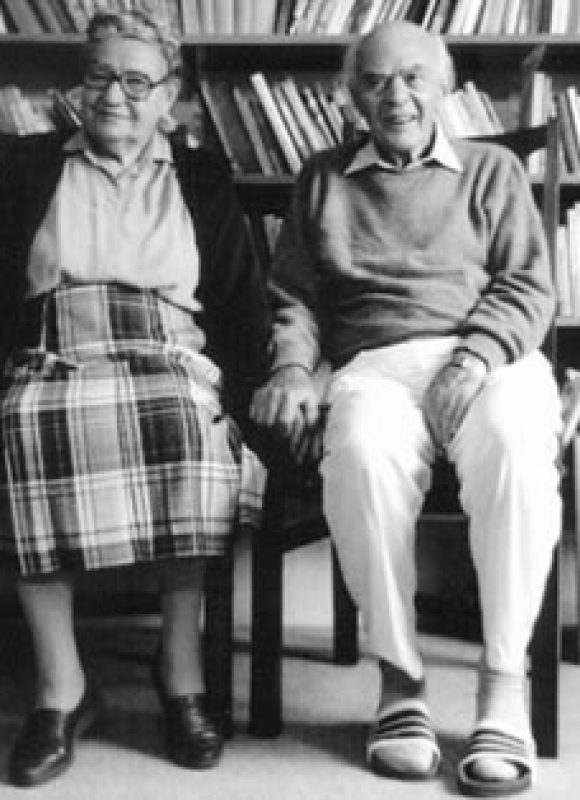PIONEER
Harold Jack Simons

Lecturer | Unionist | Human Rights Activist
Born: 1 February 1907 Died: 22 July 1995
“I remember in 1930 or 1931, during the Depression, seeing a mixed white and black procession demonstrating for jobs and wages and bread, and this impressed me greatly. You might say I had a romantic idea, but then I think people with a radical outlook who reject the existing social system are romantics – some people call them mad. You have to have a great deal of confidence and faith, you have to look for little things like that as beginnings.”
Who is
Harold Jack Simons?
Professor of African Law and Administration, he was a committed member of the Communist Party of South Africa with teaching stints at the Umkhonoto we Sizwe camps in Angola.
Professions
and Roles
Professor of law, author, academic, Marxist intellectual, trade unionist and communist party member, anti-apartheid activist.
Best Known For
Banned for his involvement with the Communist Party of South Africa and was on trial following the African mine workers’ strike of 1946.
Life highlights
- Simons was educated in South Africa and then completed his PhD at the London School of Economics, UK.
- From 1937 until 1964, Simons taught African Law and Administration at UCT.
- In 1946, Simons was put on trial with other members of the Communist Party’s Central Committee on the charge of sedition for assisting the African miners’ strike. He defended himself and the Party successfully.
- Simons was a member of the Communist Party of South Africa. He was placed under successive bans from 1952, but continued in his teaching position.
- In 1960 after the Sharpeville massacre, Simons was detained with over 2 000 South Africans. The UCT staff and students demanded his release and he was the first detainee to be released.
- Simons left South Africa in 1965 when a new policy prevented former Communists from teaching.
- Simons became a research fellow at the University of Manchester and a professor of sociology at the University of Zambia. He retired in Lusaka.
- At the request of the ANC, he spent two stints in the Umkhonto we Sizwe camps in Angola in 1977-8 and 1978-9, teaching political sociology.
- Simons worked with ANC President Oliver Tambo on the constitutional committee and drafted the guideline constitution for a free South Africa. He also worked in the ANC education department.
- Simons returned with his wife, Ray Alexander, to South Africa in 1990 after the unbanning of the ANC and other communist organisations.
IN THE WORDS OF OTHERS
“Jack Simons was one of the greatest teachers of the 20th century. As a lecturer in African Studies at the University of Cape Town from 1937 until he was banned from teaching in South Africa in 1965 and by way of his lectures and writings in his subsequent exile, all the enlightenment of the century flowed through him – into the freedom movement of South Africa and beyond.
It is not just the way he influenced so many individuals. It was the impact he had on the culture of a people. The new South African Constitution requires that the values of an open and democratic society should be nurtured. Simons fought all his life both for openness and democracy. His intellectual rigour, the honesty of his person, the sweep of his information, the humanity of his vision and interactiveness and the vitality of his ideas, imprinted themselves on the generation that fought hardest for liberty and made the most direct contribution to achieving the new constitutional order.
The Jack Simons method has become part of the dialogue and truth-seeking of the whole South African nation. The so-called miracle that we are all living through in South Africa is really the product of the multiple efforts of reason, will and belief of millions of people. Right at the heart of it all, unafraid of rationalism and unembarrassed by altruism, urging us to discover the truth of our lives and of the world we live in, was Jack Simons.”
– Ayesha Dawood
“… one of South Africa’s first and most influential Marxist intellectuals. He will be remembered as a dedicated teacher, an original thinker, a lucid writer, and as a life-long fighter for non-racialism and for socialism.”
– Hugh Macmillan, author
“Jack Simons had been a professor of law at the University of Cape Town, in fact he taught you law that shows how old he was but he is this nice, soft, avuncular person in whose presence you feel so safe, you feel so comfortable, he was married to the late Ray Alexander so we go to their place it was the first time I saw a house with so many books, there was a book around him all the time so we go there and we have our meetings, etc. The camaraderie among all of us, the mutual respect, the opportunity to debate a whole lot of things, you and Kader in particular were writing profusely about issues pertaining to law and order, human rights etc. and the opportunity to engage in those discussions I sorely miss even today.”
– Penuell Maduna, former Minister of Justice
